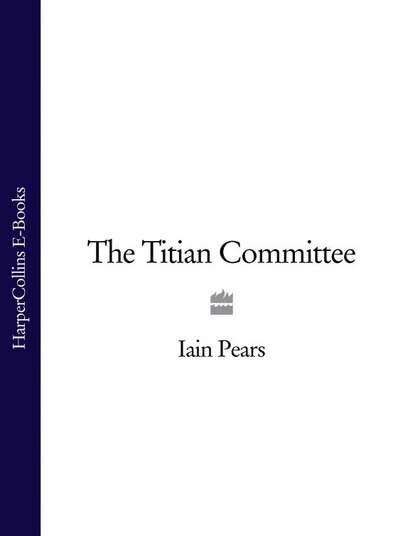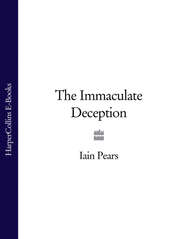По всем вопросам обращайтесь на: info@litportal.ru
(©) 2003-2024.
✖
The Titian Committee
Автор
Год написания книги
2018
Настройки чтения
Размер шрифта
Высота строк
Поля
‘Perhaps she had friends in?’
This he found a great joke and looked at Flavia as though he’d found a soul-mate at long last. ‘Oh, yes,’ he gurgled. ‘Friends, eh?’ He cackled away merrily.
Flavia sighed once more. It was always hard to deal with gossips. On the one hand, they had an incurable urge to tell you what they knew, on the other there was the long-standing unwillingness to say anything to the police at all. The result was often such a series of elliptical hints, designed to satisfy both imperatives.
‘Tell me about the others,’ she began, and promptly abandoned the question when she saw the distrustful expression taking over again. ‘I assume your wife was in the kitchen with Dr Miller on Friday evening?’
This he could answer. No harm in exonerating people. ‘Yes. He came to the kitchen from the laundry-room to ask for some water at about half ten. We had a little chat. Very considerate, charming man.’
‘And he didn’t leave the island at any time?’
‘Oh, no. He was here, all right. No public transport and if he’d taken a taxi I would have seen it. And before you ask,’ he said conclusively, ‘there are no private boats here at the moment he could have taken.’
‘You have to open the door to let people in after hours?’
‘No. People are given their own keys. But, as I say, I was on duty from six to midnight and would have seen anybody coming or going. No one did.’
That seemed pretty conclusive. After a brief pause to note the conversation down, she made her way through to the second cloister in search of the committee’s rooms. Yet again, her sense of direction abandoned her and she ended up at what seemed to be a service entrance somewhere at the far end of the building. With a curse, she turned round and began again, this time finding herself in the kitchens.
Third time lucky, she hit the right floor and made her way along a corridor, with doors that were clearly the rooms of those members of the committee who wanted the free accommodation. Only Miller and Masterson did, it seemed. The rest preferred to make their own arrangements.
Whatever the quality of the workmanship in the roofs, the meeting rooms seemed more than adequate for their purpose. Lashings of oak panelling, a handsome ceiling painting of a suitably religious nature, even though the large number of naked bodies swirling around seemed scarcely designed to keep the old monks’ minds on their devotions, along with all the normal equipment of modern conference centres – comfortable armchairs, settecento tables, Venetian glassware, Flemish tapestries, that sort of thing.
And, in the middle, sitting upright at the end of the long wooden table evidently used for meetings, was Professor Roberts. She was sure it was him, although there were three people in the room; whereas the oldest man very much looked the part of the Great Man of his profession, complete with silver hair, tweed jacket, aquiline nose and aristocratic bearing, the others could never pass as great anythings.
Professor Roberts would, on balance, have approved of Argyll’s brief summary of him as being largely accurate. He was a man who had learned early in life that you cannot arrange matters so that everybody loves you simultaneously. That being the case, the best you can do is to ensure that those who dislike you can do you no harm.
This golden rule he had followed since he had formulated it about a quarter of a century previously, but it should not be taken as the mark of an unpleasant man. Far from it. Roberts had a great reputation for his civility, his hospitality and his grace. An entire generation of young scholars referred to him in awed tones because of his immense knowledge and his kindness to students. As Argyll had said, he valued his reputation for integrity, and worked hard to preserve it.
Flavia’s identification was, of course, correct. Roberts introduced himself in the way of someone conferring a favour, and brusquely introduced the other men – who seemed very much less at ease – as his colleagues on the committee, Dr Miller and Dr Kollmar. From there on he made it clear that he was the one who was going to do all the talking, not that the others showed the slightest sign of wanting to intervene.
Flavia went through all the standard preliminaries, paying attention more to the way he answered rather than to what he actually said. The facts she knew already: he’d been on the committee since it was founded, held a chair in England, had published this, that and the next thing. All standard and uninteresting. She also sneaked a look in her notes to remind herself about the other two. Kollmar a German and on the committee since it was founded. Miller another American, more junior, job at a college in Massachusetts, where he was due to come up for tenure next year.
‘Coffee?’ Roberts asked, gesturing at an eighteenth-century silver pot in the corner.
While he was pouring, she examined the pile of notes on the desk. There was nothing else to do; the others didn’t seem to want to take up the conversational slack. There was one book, and she picked it up.
‘This is Masterson’s, isn’t it?’ she said, reading the cover.
Roberts gave her a penetrating look from behind the coffee-pot, and then relaxed. ‘That’s right. I borrowed it from her on Wednesday. I needed to refer to some parts for an article I am writing. There are some excellent passages in it.’
A bit of a back-handed compliment, she thought. It looked deadly dull stuff to her. Still, part of her job as an artistic expert. She’d get Argyll to have a flip through; it would do him good to read something serious for once. She asked if she could take it, as it should be with Masterson’s other possessions for return to her next of kin.
Roberts was disapproving. ‘I would much rather you didn’t,’ he began. ‘I still need it.’
Flavia suggested that she thought Masterson’s murder might be slightly more urgent a matter and he took the hint, reluctantly but with grace.
‘But of course. Extraordinarily selfish of me. I confess I still can’t believe she is dead. But do take it. I can survive without, I’m sure.’
There was a scuffle from Kollmar, the first real sign of life the man had shown. He was perhaps ten years younger than Roberts, but seemed half a decade older. He looked as though life had not been hugely kind in its dealings with him. Short and wiry, with a pinched face lined by years of preoccupation and worry. He was scruffily but passably dressed and Flavia instantly put him down as one of life’s victims. Not, of course, she reminded herself with an upsurge of professionalism, that this implied innocence. Or even that he was pleasant.
‘I was wondering –’ he began.
‘Oh, indeed. Indeed,’ Roberts interrupted as he came over with Flavia’s coffee-cup. ‘Thoughtless of me. Please do go. I’m sure that will be all right. Perhaps you can get the results round to me this evening? I really need that information quickly.’
He turned his attention to Flavia. ‘Dr Kollmar is in a great hurry to get to the library to do some work. That won’t cause you any problems, I’m sure.’
It clearly wouldn’t make any difference if it did, she thought as the German picked up his briefcase and scurried off. In fact, she was a touch irritated, both because she would now have to go and see the man separately, and because Roberts had so effortlessly taken charge and organised matters for his own benefit. She felt sure that all Kollmar was going to do before he was interrupted and sent off was to ask for a cup of coffee himself. Still, interesting. There was no doubt who was the head of this little band of brothers.
That little task accomplished, Roberts handed over her coffee and sat down once more, arranging himself into the same pose of authoritative elegance she had noticed when she first walked in.
‘It occurred to me to wonder,’ he murmured quietly, ‘which one of us you suspect. Am I, for example, on your list?’
He said it in a way clearly designed to indicate that he considered the idea ludicrous, but Flavia thought she could just detect a flicker of concern, deep below the surface. Far more obvious was the anxiety that Miller demonstrated at a remark that was probably designed only to catch Flavia off-balance. Miller was very much upset. In fact, he looked as though he was about to be sick.
‘What makes you think that we suspect any member of the committee? Surely Commissario Bovolo has told you –’
‘About his Sicilian. Yes, and of course that’s comforting, even if it is nonsense.’
‘Why do you think that?’
‘Louise was an American. She’d lived for years in New York and knew very well how to take care of herself. She was a very determined and confident woman. Not the sort of person who’d be caught like that.’
‘Does this mean you would like to implicate one of your colleagues?’ she asked.
‘Good heavens, no,’ he said, evidently shocked at the very thought of doing something quite so vulgar. ‘I have not the slightest idea who killed her. But it occurred to me that you might wonder if the killer may have had a better reason than theft.’
‘Which you did not.’
Roberts inclined his head. ‘Which I did not. Nor, I must add, did anyone else I know. In my case it was quite the opposite, in fact. I rather saw her as my own protégée.’ He smiled as he spoke. ‘Although, of course, Louise was much too proud and independent ever to accept such a subservient role with anyone. Which was why we had our differences of opinion that, alas, were not resolved before her death.’
‘What was she like?’
‘How do you mean?’
‘As a historian, a person, a colleague. Liked? Admired? What?’
‘That, of course, depends on who you ask,’ Roberts said, unknowingly echoing Argyll’s own words about him. ‘As far as her work went, she showed very great promise indeed.’
Again, a touch of condescension towards a woman in her late thirties. ‘Personally,’ he went on, ‘I never had any cause to regret recommending her for membership. She was briefly a pupil of my great friend Georges Bralle, and that was more than good enough for me.’
Miller gave a faint snort, and Flavia looked at him enquiringly. Roberts, she noted, also gazed at him, although with a more disapproving air.
‘Well,’ Miller began reluctantly, evidently uncertain whether he was about to step out of line and still not entirely recovered from the nasty shock that Roberts had given him with his opening remarks, ‘that’s not exactly true. She was at Columbia with me and took off for a year to live in Paris. She had enough family money to do that sort of thing. She joined Bralle’s classes, and came back a year later with a reference from him. On the strength of that she got her job and never looked back.’
Flavia noted the comment, which didn’t exactly brim over with affection and regret, but decided to ignore it for the time being. She turned her attention back to Roberts. ‘She joined about eighteen months ago, is that right?’
He nodded again. ‘Yes. Because Dr Bralle retired. Do you know the story of the committee, by the way?’










